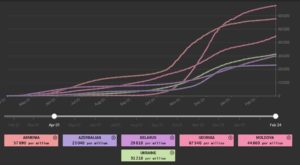Within EU-funded COVID-19 Solidarity Programme for the Eastern Partnership countries AFEW International prepares bi-weekly updates on the COVID-19 developments in the region (Armenia, Azerbaijan, Belarus, Georgia, Moldova, and Ukraine).
You can now find all the updates in the COVID Corner on our website.
As of 25.02.2021
Regional overview
The number of coronavirus cases per population ratio since the start of the active phase of the pandemic (April 1 2020) in the 6 countries of the EaP
Source: Sciences Po Media lab Coronavirus Country Comparator
| Location | Confirmed | Recovered | Deaths |
| 171,227 | 162,984 | 3,179 |
Cases of COVID-19
— The pressure on the Armenian health care system has eased during the past weeks, the number of daily registered cases of infection has significantly decreased.
Measures to contain the epidemic
— The quarantine in Armenia declared on January 11 is still in place till July 11, 5 p.m.
Vaccine
— The European Union and the WHO Regional Office for Europe will support together with the deployment of COVID-19 vaccines and vaccination in Armenia. The project funded by the European Union and implemented by the World Health Organisation (WHO) will cover all phases of COVID-19 vaccine deployment and vaccination and will serve as a major investment to strengthen the routine immunisation system. The project will be implemented by the WHO over a three-year period as part of a €40 million EU-funded initiative to support six Eastern partner countries in preparing, deploying and monitoring the rollout of COVID-19 vaccines.
Education
— Schools in Armenia resumed in-person learning from December 7. Clinically vulnerable and 65+ employees of schools can work remotely. At-risk children will continue learning remotely.
Situation report Azerbaijan
| Location | Confirmed | Recovered | Deaths |
| 233,644 | 228,157 | 3,206 |
Cases of COVID-19
— A minor decline in COVID-19 infections is registered in Azerbaijan through the past weeks.
Measures to contain the epidemic
—The nationwide special quarantine regime remains in place in Azerbaijan until at least April 1.
— Land borders remain closed, and most passenger flights are suspended. UIA to resume flights to Baku from March 13, 2021.
— Nonessential stores are currently operating in accordance with strict hygiene and social distancing mandates. Protective face coverings and social distancing are mandatory at all times in enclosed or crowded public spaces; public gatherings of more than 10 people are prohibited nationwide. The Baku Metro remains closed; public transport is suspended at the weekend in Baku and some other urban centers until at least April 1.
Vaccine
— On February 8, Azerbaijan has begun the second step of its COVID-19 vaccination program as it undertakes a mass inoculation of its health care workers and older citizens over 65.
— Azerbaijan has imported about 848,000 doses of CoronaVac to date, part of a multi-pronged vaccination strategy. Health officials say the country will receive a total of 4 million doses of CoronaVac, half of which will be through the COVAX global vaccine-sharing program.
— The country also is slated to receive 506,400 doses of the British AstraZeneca Oxford vaccine through COVAX, which are supposed to start arriving sometime in February.
— Azerbaijan also is taking part in an experiment, along with Russia, Ukraine, and several countries in the Middle East, in which subjects will get a first dose of the AstraZeneca and then a second dose of Russia’s Sputnik V vaccine.
Education
— Schools in Azerbaijan have returned to full-time education on February 8, and kindergartens, universities and vocational schools have reopened on February 15.
— As of February 23, pupils of four schools and 84 classes in Azerbaijani schools transferred to distance learning due to the outbreak of coronavirus infection after resuming full-time education on February 8.
Situation report Belarus
| Location | Confirmed | Recovered | Deaths |
| 281,707 | 271,733 | 1,939 |
Cases of COVID-19
— Belarusian Health Minister Dmitry Pinevich said on February 24 that the third wave of coronavirus promises to be less intense. The minister said the intensity of the third wave of coronavirus would depend on the introduction of new strains, as well as the degree of vaccination coverage of the contingents.
— The official said Belarus is in the second wave of COVID-19. The incidence rates are decreasing in all regions. According to the Health Minister, the number of vaccinated people in Belarus is almost 25,000. Moreover, 100,000 doses of the Chinese vaccine arrived in Belarus, and another 100,000 doses will arrive in March.
Measures to contain the epidemic
— The Healthcare Ministry’s anti-coronavirus recommendations remain the same – social distancing, limiting face-to-face contact, avoiding crowds, wearing masks.
| Location | Confirmed | Recovered | Deaths |
| 269,800 | 263,727 | 3,475 |
Cases of COVID-19
— Georgia detected three cases of the UK coronavirus strain so far, said Head of the National Centre for Disease Control (NCDC) Amiran Gamkrelidze on February 24.
Measures to contain the epidemic
— On February 24, the Georgian government has announced the lifting of several coronavirus restrictions:
- On February 24, ski resorts have opened in Georgia, while cable cars will start operations on March 8.
- Also on February 25, intercity traffic has resumed in the country.
- The restaurants across Georgia will resume full service from the beginning of March. In the Black Sea resort town of Batumi restaurants will be opened on March 1, and from March 8 in the rest of Georgia.
- Conferences and training sessions will be allowed again on March 1, and gyms will resume operations on March 15.
- Museums and libraries will be opened on March 1.
- Theatres, sports clubs, ensembles will be able to resume rehearsals on March 15, and fully resume activities (theatrical performances, sports competitions with spectator attendance) from April 1.
- Shopping malls and markets will resume operations on weekends from March 8.
- However, the restriction on movement will remain in force from 21:00 until 05:00.
— Travellers from Armenia, Azerbaijan, Ukraine, Kazakhstan, Russia and Belarus will be allowed to enter Georgia after presenting a negative PCR test from the past 72 hours at the border starting March 1. This will apply only to air borders and that the current restrictions on the land border remain in force.
Education
— Private and public kindergartens will open on March 1. Once every two weeks, 20% of employees will have to do a Covid-19 test.
— Higher and vocational schools will be able to resume clinical, practical, laboratory activities and conduct examinations in a non-distance format from March 1, and studies in lecture halls will resume March 15.
— The European Union and the WHO Regional Office for Europe will support together with the deployment of COVID-19 vaccines and vaccination in Georgia. The project funded by the European Union and implemented by the World Health Organisation (WHO) will cover all phases of COVID-19 vaccine deployment and vaccination, and will also serve as a major investment to strengthen the routine immunisation system.
Situation report Republic of Moldova
| Location | Confirmed | Recovered | Deaths |
| 180,150 | 163,896 | 3,846 |
Cases of COVID-19
— The pace of growth in coronavirus cases continued to rise for the fourth consecutive week. The average number of daily cases over the last seven-day period is now 938, which represents an increase of 136 cases compared to the same figure for the previous week.
— The continuous increase in the number of COVID-19 patients has brought the medical system close to the limit in Chisinau, the capital of Moldova, with less than 100 free hospital beds left currently in the city. “1,320 coronavirus patients are hospitalized in municipal health institutions, and the maximum capacity is 1,400 treatment beds,” Tatiana Bucearschi, head of the General Directorate of Social Assistance and Health, told a municipal services meeting.
— Official statistics show that nearly 40 percent of people hospitalized for COVID-19 in the country are now in hospitals in the capital.
Measures to contain the epidemic
— Authorities in Moldova have extended their country’s nationwide COVID-19-related state of emergency and associated restrictions until at least April 15.
— Private gatherings of up to 20 people are permitted but must take place away from schools, hospitals, and other public institutions. Most businesses are permitted to operate provided they adhere to strict health and safety measures; shopping centers are closed on weekends. Facemasks are mandatory in enclosed public spaces and on public transport. Public transport is operating operate at 50-per cent capacity. People over 63 years of age must remain in their accommodations except for essential purposes.
Vaccine
— Moldova has not yet started a vaccination campaign against COVID-19, but the EU has promised to send the first batches to Chisinau as soon as possible. The health situation in Moldova is concerning.
| Location | Confirmed | Recovered | Deaths |
| 1,325,841 | 1,159,311 | 25,596 |
COVID-19 cases
— Ukraine has registered an almost 40 per cent jump in new coronavirus cases over the past 24 hours. A total of 8,147 cases were registered on February 25, the highest figure since mid-January when the number of new cases stood at 8,199.
— The ministry’s data shows most of the new cases were registered in the western part of the country and in the capital Kyiv. The country has registered a total of more than 1.3 million cases with 25,596 deaths.
— Coronavirus cases have picked up after a lull during a tight lockdown at the start of the year. The government has set up mobile hospitals in western Ukraine to cope with a sharp spike in cases in the Ivano-Frankivsk region.
Measures to contain the epidemic
— The Cabinet of Ministers, Ukraine’s government, at a meeting on February 17 extended the coronavirus-related quarantine until April 30, 2021.
— Ukraine’s Cabinet of Ministers has banned regular and irregular passenger transportation by road and rail, including trams, trolleybuses, the subway, and commuter trains, in the regions which were included in the COVID-19 red zones.
Education
— As of February 25, some 148 classes in 97 schools in Kyiv city have been transferred to distance learning due to a rise in coronavirus cases, according to Kyiv Mayor Vitali Klitschko. In addition, 30 groups in 28 kindergartens have been temporarily closed due to COVID-19 cases.
— Klitschko assured that the situation with the educational process in the capital is under control.
Vaccine
— On February 25, Ukraine started its COVID-19 vaccination campaign with 159 medical workers getting the first dose of AstraZeneca vaccine, the first batch of which came to Ukraine on Tuesday from India.
~
Interesting reads
— EU neighbours: New EU programme to support readiness for vaccination efforts in Eastern Partnership countries with WHO read.
— EU neighbours: ‘Together we will beat this pandemic faster’. EU and WHO to support the deployment of COVID-19 vaccines and vaccination in Armenia read.
— EU neighbours: ‘The vaccines will reach those that need them most’. EU and WHO to support the deployment of COVID-19 vaccines and vaccination in Georgia read.
— Reuters: Coronavirus cases in Eastern Europe surpass 10 million – Reuters tally read.
— IWPR: Armenia Plans Vaccine Strategy read.





